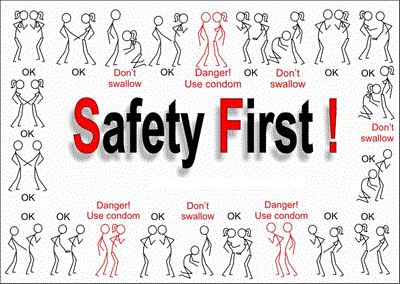No sex or safe sex?
- font size decrease font size increase font size
 Older demographics are still having sex, but, according to new studies, young people are doing it even more than their parents did, their grandparents, or any other generation in history. So before you know it, your kids are grown up, and on their own. "The right time to talk to them about sex and other tough issues, is sooner than you think."
Older demographics are still having sex, but, according to new studies, young people are doing it even more than their parents did, their grandparents, or any other generation in history. So before you know it, your kids are grown up, and on their own. "The right time to talk to them about sex and other tough issues, is sooner than you think."
Often health organizations convey the general message that parents should talk to their children about ‘sex’, without telling parents what specific topics to discuss. Studies reveal that parents tend to do more talking than adolescents when discussing sexuality and fail to educate their children on safe sex. Adolescents who do not talk during these conversations may not encode them as conversations about sex or AIDS, or may not even be listening if parents are dominating the conversations.
Abstinence is an absolute answer to preventing STDs and adolescent pregnancy. However, abstinence is not always a practical or desirable option. Therefore, whether we like it or not we need to educate our children by bringing up the topic of safe sex in the conversation.
Definition
Safe sex means taking precautions during sex that can keep you from getting a sexually transmitted disease (STD), or from giving an STD to your partner. These diseases include genital herpes, genital warts, HIV, chlamydia, gonorrhea, syphilis, hepatitis B and C, and others.
The following factors increase your risk of getting a sexually transmitted disease (STD):
-
Not knowing whether a partner has an STD or not
-
Having a partner with a history of any STD
-
Having sex without a male or female condom
-
Using drugs or alcohol in a situation where sex might occur
-
If your partner is an IV drug user
-
Having anal intercourse
Many of the organisms that cause sexually transmitted diseases live on the penis, vagina , anus, mouth, and the skin of surrounding areas. Most of the diseases are transferred by direct contact with a sore on the genitals or mouth. However, some organisms can be transferred in body fluids without causing a visible sore. They can be transferred to another person during oral, vaginal, or anal intercourse. Therefore, practicing safe sex, goes beyond use of condoms. Both male and female condoms dramatically reduce the chance you will get or spread an STD. However, condoms must be used properly:
Condom Usage:
-
Keep in mind that STDs can still be spread, even if you use a condom, because a condom does not cover surrounding skin areas. But a condom definitely reduces your risk.
-
Lubricants may help reduce the chance a condom will break. Use only water-based lubricants, because oil-based or petroleum-type lubricants can cause latex to weaken and tear. Using condoms with nonoxynol-9 (a spermicide) can help prevent pregnancy , but may increase the chance of HIV transmission because the spermicide can irritate the vaginal walls.
-
The condom should be in place from the beginning to end of sexual activity and should be used every time you have sex.
-
Use latex condoms for vaginal, anal, and oral intercourse.
Next to abstinence and condom use, the least risky approach is to have a mutually monogamous sexual relationship with someone you know is free of any STD. Ideally, before having sex with a new partner, each of you should get screened for STDs, especially HIV and hepatitis B, and share the test results with each other.
Safe sex requires prior planning and good communication between partners. Given that, couples can enjoy the pleasures of a sexual relationship while reducing the potential risks involved.
Safe sex also entails:
-
Being responsible. If you have an STD, like HIV or herpes, advise any prospective sexual partner. Allow him or her to decide what
 to do. If you mutually agree on engaging in sexual activity, use latex condoms and other measures to protect the partner.
to do. If you mutually agree on engaging in sexual activity, use latex condoms and other measures to protect the partner. -
If pregnant, take precautions. If you have an STD, learn about the risk to the infant before becoming pregnant. Ask your provider how to prevent the fetus from becoming infected. HIV positive women should not breastfeed their infant.
-
Know your partner. Before having sex, first establish a committed relationship that allows trust and open communication. You should be able to discuss sexual histories, any previous STDs or IV drug use. You should not feel coerced or forced into having sex.
-
Stay sober. Alcohol and drugs impair your judgment, communication abilities, and ability to properly use condoms or lubricants.
With that i guess, the buck stops with you. Human sexuality is a topic that many fail to discuss and bring up in conversations, yet it is known to be the most popular. Practice safe sex.
